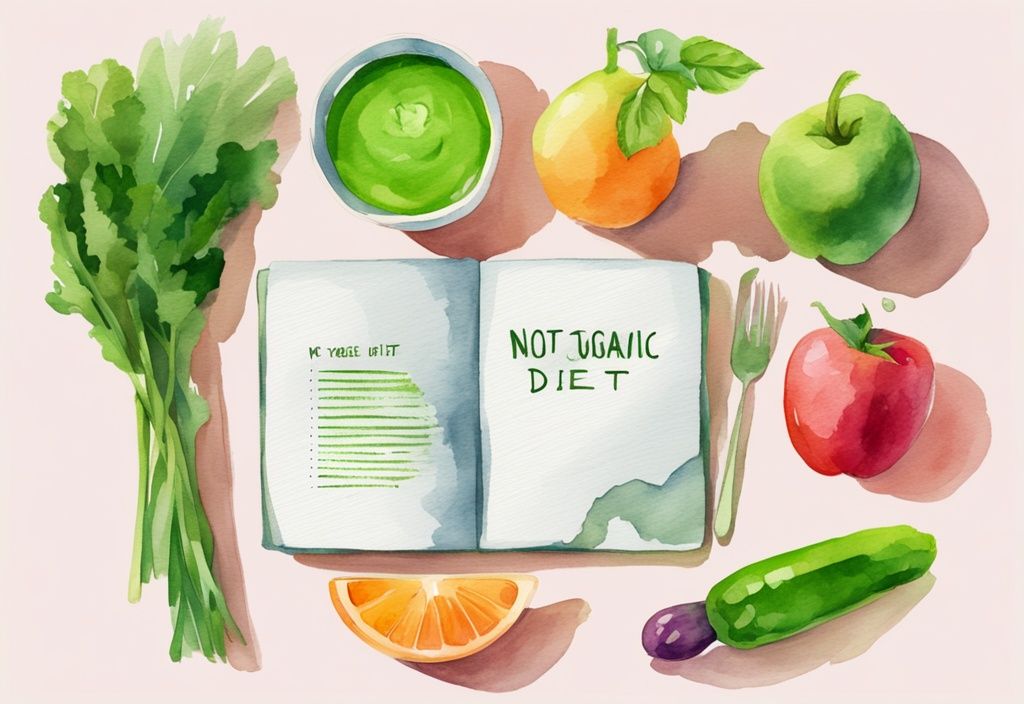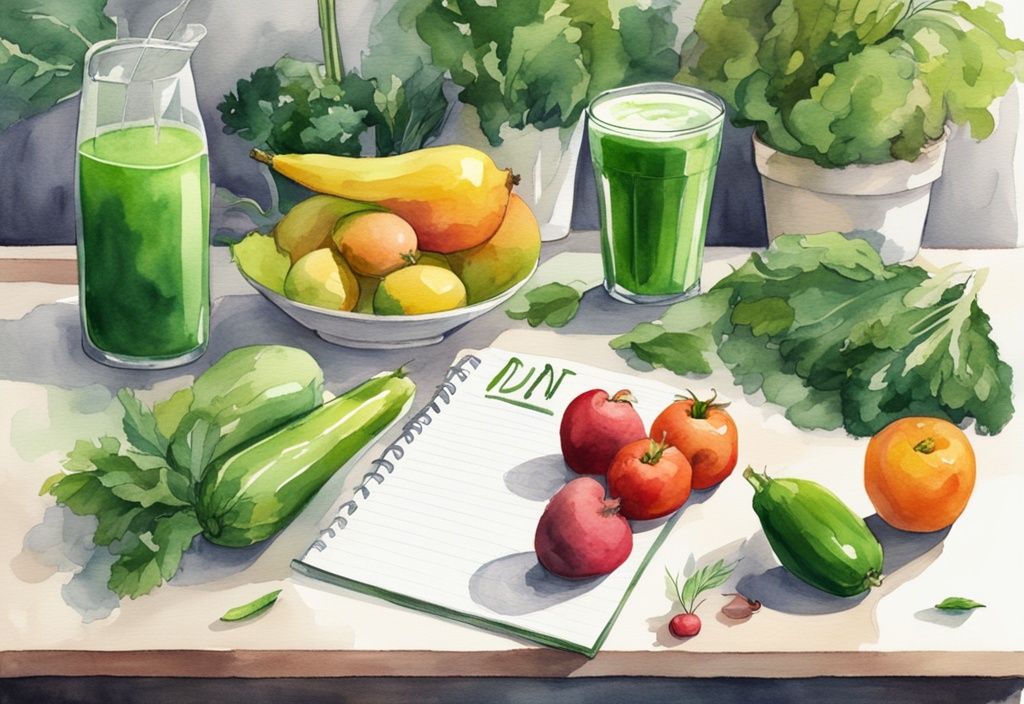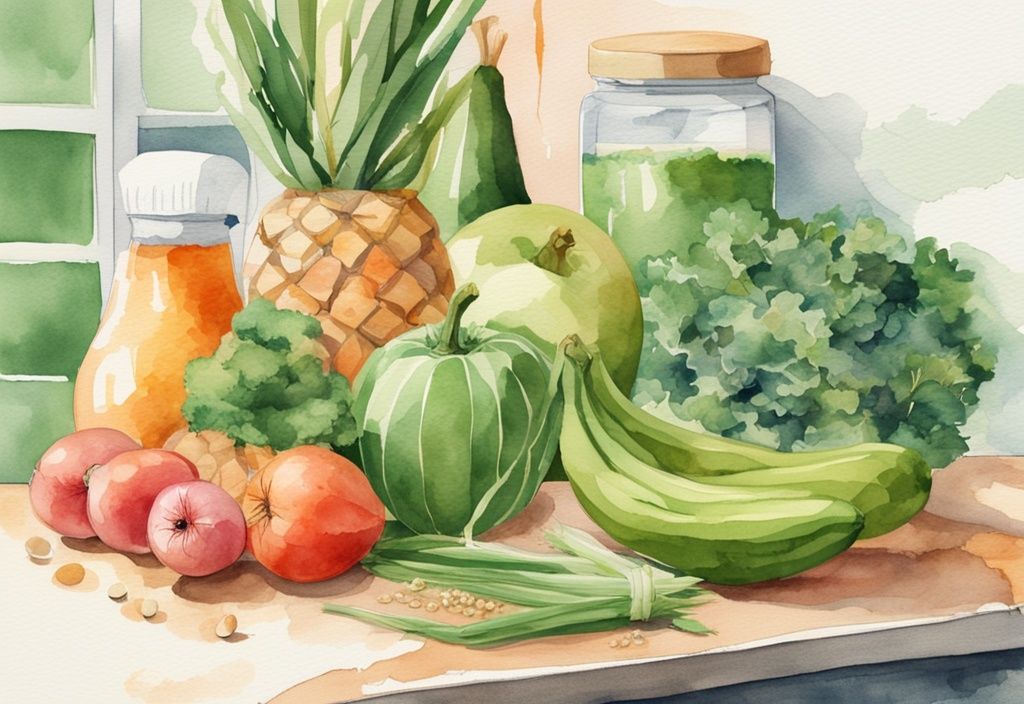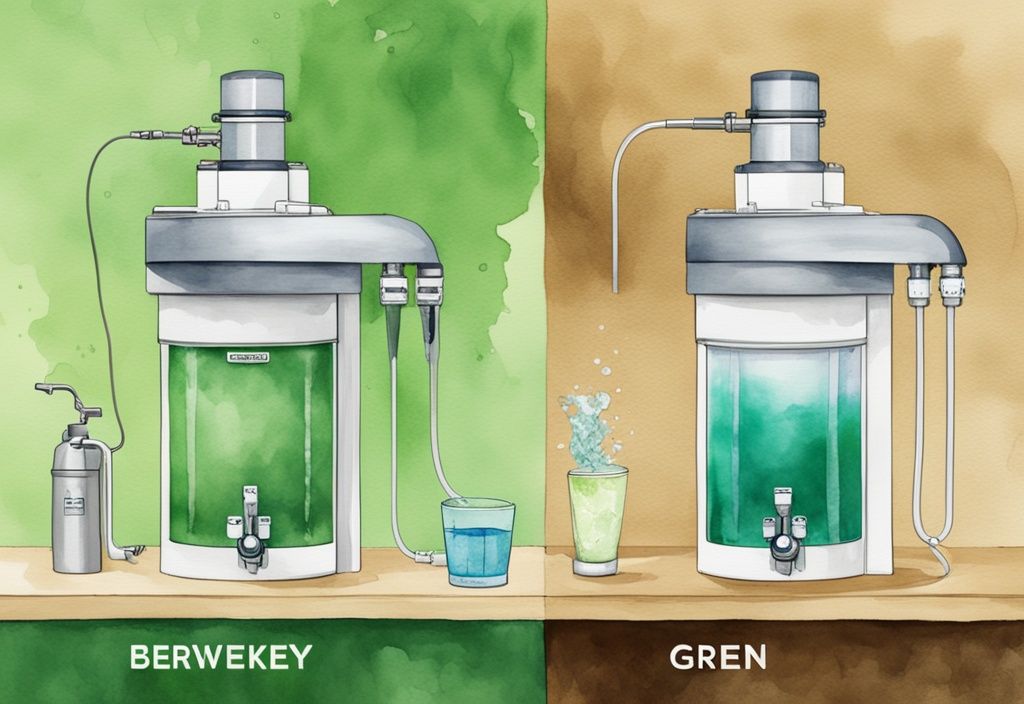Discover the Health Benefits of a Non Toxic Diet Approach
Are you tired of dealing with persistent health concerns or fatigue? Ever considered the role of your diet? I landed into the world of non-toxic eating when I too was plagued by similar issues. Such a dietary approach essentially emphasises on ditching harmful additives and chemicals and embracing whole foods. And let me tell you, it works wonders!
In this article, I’ll unwrap the basics of a non-toxic diet, offering you practical guidance on deciphering food labels and cooking healthier meals. We’ll explore making simple tweaks to the way we eat that can offer profound improvements in your wellness.
Let’s set out on this journey together towards healthier living, reducing the toxic load on our bodies, one meal at a time!
Why is a Non-Toxic Diet Important?
The Impact of Toxins on Health
A non-toxic diet is essential for maintaining overall health and well-being. Various toxins found in food, such as pesticides, heavy metals, and artificial additives, can significantly impact human health; to understand more about pesticide residues in food, you can click here. These harmful substances are linked to a multitude of health risks. Exposure to dietary toxins is associated with the development of obesity, heart disease, diabetes, and even certain types of cancer. The need for a non-toxic diet becomes increasingly crucial when understanding the serious potential health risks involved.
Toxins can also disrupt the body’s hormonal systems. For instance, they can reduce testosterone levels and interfere with thyroid function, leading to complications such as hypothyroidism. The endocrine system, responsible for hormone production and regulation, is particularly vulnerable, making the adoption of a non-toxic diet critical for maintaining hormonal balance.
Moreover, the impact of toxins can begin as early as prenatal development. Prenatal exposure to toxins like phthalates—a common type of endocrine disruptor—has been linked to conditions such as ADHD, reproductive deformities, and infertility later in life. Pregnant women must be particularly cautious, as exposure to these chemicals can deeply affect fetal development.
Children are incredibly susceptible to the adverse effects of toxic chemicals found in food. Their neurological and endocrine systems are still developing and are more likely to be disrupted by these harmful substances. Neurological issues, such as developmental delays and cognitive impairments, as well as long-term endocrine issues, are significant concerns. Hence, adopting a non-toxic diet is crucial for safeguarding the health of the younger population.
Understanding the severe implications of dietary toxins underscores the importance of a non-toxic diet. By prioritizing consumption of whole, organic, and minimally processed foods, individuals can significantly reduce their exposure to these harmful substances, leading to improved health outcomes and a better quality of life.
The Basics of a Non-Toxic Diet
Core Elements of a Non-Toxic Diet
A non-toxic diet is all about eliminating harmful substances and choosing wholesome, nutrient-packed foods that support optimal health. Here’s a detailed look into the core elements that define this approach to eating:
- Whole Foods: At the heart of the non-toxic diet is an emphasis on whole foods. These are foods that are unprocessed or minimally processed, retaining their natural nutrients. Imagine the vibrancy of fresh fruits, vegetables, and whole grains that fuel your body with every bite.
- Organically Grown Produce: To minimize exposure to pesticides and artificial fertilizers, the non-toxic diet favors organically grown fruits and vegetables. Cultivated without harmful chemicals, these produce items are not only safer but also more nourishing in the long run.
- Lean Cuts of Organic or Grass-Fed Meats: Choosing meat means opting for organic or grass-fed options. These meats are free from antibiotics and hormones, reducing the intake of potentially harmful substances. It’s like giving your body the clean energy it deserves.
- Wild-Caught Fish: Fish is an exceptional source of protein and healthy fats. If you’re curious about other clean and non-toxic products for your family, you might want to learn more about are Millie Moon diapers non toxic. Wild-caught varieties, as opposed to farm-raised, are less likely to contain toxins like antibiotics and pesticides, making them a safer and more wholesome choice.
- Unprocessed Grains, Legumes, Nuts, and Seeds: These foods, rich in essential vitamins, minerals, and fiber, bring immense nourishment. By avoiding processed versions, you’re steering clear of unnecessary additives and preservatives that can sneak into your diet.
- Antioxidant-Rich Foods: Foods high in antioxidants, such as blueberries, dark chocolate, and goji berries, become your allies in fighting oxidative stress. They protect the body from harmful free radicals, helping you feel vibrant and energized.
- High-Fiber Foods: A non-toxic diet brims with high-fiber items like lentils, blackberries, and almonds. Fiber aids digestion and helps to remove toxins from the body, keeping you feeling light and healthy.
- Healthy Fats: Essential for overall health, healthy fats play a pivotal role in this diet. Found in olive oil, avocados, and fatty fish like salmon, these fats support brain health and reduce inflammation, promoting a sense of well-being.
- Cruciferous Vegetables: Vegetables such as broccoli, kale, and cabbage are known for their detoxifying properties. They promote liver function, aiding the body’s natural detox processes, making every meal a step towards better health.
- Avoid Refined Sugars, Processed Foods, and Trans-Fats: Steer clear of refined sugars, processed foods, and trans-fats. These can introduce toxins into the body, disrupt metabolic functions, and contribute to various health issues. Focus on natural sweeteners and whole foods to maintain a clean diet and a happier you.

How to Start a Non-Toxic Diet
Transitioning from Processed to Whole Foods
Embarking on a non-toxic diet can be a meaningful journey that yields significant health benefits. Begin by gradually swapping out processed foods for natural, whole options. Trust me, the first step is simply adding more fresh fruits and vegetables to your daily intake. Opting for organic produce is a wonderful way to cut down on pesticide exposure. These organic choices are cultivated without synthetic pesticides or fertilizers, helping to lower the toxin levels in your body.
Gradually replacing processed snacks and meals with whole grains, legumes, nuts, and seeds can make a big difference. Processed foods often sneak in additives, preservatives, and unhealthy fats that might contribute to toxin buildup. By choosing foods in their natural state, you’ll benefit from richer nutrient profiles and fewer harmful chemicals.
Pay attention to the fish you consume. High-mercury fish like swordfish and some tuna varieties should be avoided. Instead, choose smaller, wild-caught fish such as sardines, anchovies, and salmon. These are usually lower in mercury and higher in beneficial omega-3 fatty acids. These small changes collectively pave the way for a healthier, non-toxic diet.
Understanding and Evaluating Food Labels
Understanding food labels is crucial for maintaining a non-toxic diet. Misleading labels can be a challenge—terms like “natural” are often used loosely and may not truly reflect the product’s health benefits. Look for specific organic certifications and labels to ensure that the products you select adhere to organic standards.
Certified organic labels mean the product meets organic farming standards, minimizing synthetic pesticide residues and other harmful chemicals. This is especially important for high-residue crops like apples and strawberries; choosing organic for these can significantly reduce toxin exposure.
Another useful tip is to check the PLU code numbers on produce. Typically, produce with a code starting with the number 9 is organic and free from synthetic pesticides. Besides organic labels, steer clear of products with artificial additives, colorants, and sweeteners. These synthetic components can introduce toxins into your diet, counteracting health benefits.
By taking the time to read and interpret food labels, you can make better-informed decisions that align with a non-toxic diet, supporting both your health and well-being.
Benefits of a Non-Toxic Diet
A non-toxic diet goes beyond just promoting physical health; it enhances overall well-being and supports sustainable living. Here, you’ll delve into the multiple advantages of embracing a non-toxic diet, such as boosting the immune system and enhancing digestive health.
Boosting the Immune System
Imagine waking up every day feeling vibrant and healthy, largely thanks to a non-toxic diet. By emphasizing antioxidant-rich foods like dark chocolate, blueberries, and goji berries, you provide your body with powerful tools to combat free radicals. Free radicals are unstable molecules that can cause cellular damage if left unchecked.
Boosting your immune system involves more than just antioxidants. Consuming a variety of raw fruits and vegetables ensures you obtain essential vitamins and minerals. These nutrients play a pivotal role in the production of immune cells and antibodies, creating a robust defense against illnesses. By eliminating toxins and prioritizing nutrient-dense whole foods, you’re giving your body a fighting chance to stay resilient and strong.
Enhancing Digestive Health
One of the profound impacts of a non-toxic diet is its ability to improve digestive health. High-fiber foods, such as lentils, blackberries, and almonds, are cornerstones of this diet. They facilitate the movement of harmful compounds through your digestive tract, preventing their reabsorption and supporting a cleaner system.
Fiber also acts as a nurturing prebiotic, feeding the beneficial bacteria in your gut. A balanced gut microbiome is crucial for effective digestion and overall health. Including a variety of nutrient-rich foods in your diet aids in natural detoxification processes, improving nutrient absorption and digestive harmony.
Reducing processed foods loaded with additives and preservatives further enhances your gut health. This shift not only improves digestion but also contributes to overall well-being. Embracing a non-toxic diet becomes a holistic approach to promoting digestive health and supporting your body’s natural detox systems.
This journey towards a non-toxic lifestyle is both rewarding and attainable. You’re not just optimizing your health; you’re making choices that resonate with sustainable living. With every small step, you pave the way for a healthier, more vibrant life.
Navigating Challenges of a Non-Toxic Diet
Embarking on a non-toxic diet can be a transformative journey. Each step you take towards minimizing toxins in your food can contribute significantly to your overall well-being, but it’s not without its challenges. This section covers practical strategies for managing cravings and minimizing exposure to food additives and artificial sweeteners.
Managing Cravings and Mindful Eating
Cravings for processed foods can be a major hurdle when transitioning to a non-toxic diet. One effective strategy is to replace these cravings with nutrient-dense snacks. Fresh fruits and nuts are excellent choices, providing essential vitamins and minerals without the harmful additives found in processed foods.
Mindful eating is another powerful tool in managing cravings. By paying close attention to hunger cues and nutrient needs, you can better understand your body’s requirements and reduce the tendency to reach for unhealthy snacks. Personally, I’ve found that tuning into my body’s signals has made it easier to resist the lure of processed snacks.

Finding healthy substitutes for processed foods is crucial for long-term success on a non-toxic diet. Swap out sugary, packaged snacks with whole food options like Greek yogurt with berries or homemade trail mix. This not only satisfies your cravings but also keeps you on track with your dietary goals.
Minimizing Exposure to Food Additives and Artificial Sweeteners
To adhere to a non-toxic diet, it’s important to avoid foods in cans due to the risk of BPA exposure. Instead, opt for products stored in glass jars or waxed cardboard containers. These alternatives significantly reduce your exposure to harmful chemicals.
When it comes to sweeteners, natural options like honey or maple syrup are far superior to artificial ones. They not only provide a sweet taste but also come with additional health benefits. Always check labels for preservatives and synthetic additives in packaged foods; avoiding these can further help in maintaining a non-toxic diet.
Making these changes might seem daunting at first, but remember that each small step is a victory in itself. Keeping a non-toxic diet is not just about the food on your plate, but about cultivating a mindful and sustainable lifestyle for your long-term health and well-being.
Cooking for a Non-Toxic Diet
Safe and Nutritional Cooking Methods and Cookware
Choosing the right cooking methods and cookware can significantly enhance the benefits of a non-toxic diet. First and foremost, steer clear of microwaving plastic containers. When plastic is heated, it can leach harmful chemicals into your food, jeopardizing the integrity of your diet. Instead, reach for glass or ceramic containers for microwave heating.
Investing in the right cookware is a crucial step toward maintaining a non-toxic kitchen. Although nonstick pans are convenient, they often contain chemicals like PFOA that become toxic when heated. Trust me, I’ve made that switch myself and haven’t looked back. Opt for non-toxic cookware such as cast iron, stainless steel, ceramic, and glass.
These durable materials ensure that no harmful chemicals leach into your food, making every meal safer and healthier.
Your cooking methods matter just as much. Steaming, baking, and low-heat cooking methods are particularly beneficial for preserving the nutritional value of your meals while aligning with your non-toxic lifestyle. If you’re also concerned about the products you use on your skin, you might wonder, is Skinceuticals cruelty free?
Steaming is a personal favorite of mine since it retains most vitamins and minerals. Baking and low-heat cooking help prevent the formation of harmful compounds that can occur at high temperatures. With these methods, not only does your food maintain its nutritional quality, but it also aligns perfectly with the principles of a non-toxic diet.
By taking the time to choose the right cookware and cooking methods, you’re investing in both your health and a non-toxic lifestyle. These thoughtful choices transform your kitchen into a sanctuary of well-being. Implement these practices to see a notable difference in how you feel and the nutritional quality of your meals. It’s a journey worth taking—for your health and for the planet.
Every small step towards a non-toxic diet can have a significant impact. Consider making these changes in your kitchen to enhance your overall well-being and enjoy meals that are as safe as they are delicious.
Integrating Non-Toxic Diet into Lifestyle
Maintaining a Non-Toxic Diet Long-Term
Shifting to a non-toxic diet is about embracing gradual changes that foster a sustainable lifestyle, rather than seeking a quick fix. This method helps cultivate lasting habits that yield continuous health benefits. Start by adding more whole foods and organic ingredients to your meals. Avoid processed foods as much as possible, as they often contain harmful additives and preservatives that increase toxin consumption over time.
To develop enduring healthy habits, prioritize home-cooked meals using organic ingredients. By preparing food at home, you gain control over what goes into your dishes, reducing dependence on processed and pre-packaged products. Focus on a variety of nutrient-dense foods, such as organic fruits and vegetables, lean organic meats, and whole grains. These are the foundation of a non-toxic diet.
Staying informed about environmental and food safety is vital. Learn about the sources of toxins in food and the best practices for avoiding them. This includes understanding food labels, pesticide exposure, and the significance of choosing organic products. Being knowledgeable empowers you to make informed decisions that support your non-toxic diet goals.
Regular physical activity is another crucial element of maintaining a non-toxic diet long-term. Exercise enhances the benefits of a non-toxic diet by promoting overall health and aiding the body’s natural detoxification processes. Whether it’s a daily walk, yoga, or more vigorous workouts, incorporating consistent physical activity will bolster the positive effects of a non-toxic lifestyle.

FAQs about a Non-Toxic Diet
Exploring the intricacies of a non-toxic diet can seem overwhelming, but with the right information, the transition becomes manageable and incredibly rewarding. These frequently asked questions dive into the core aspects of adopting a non-toxic diet and how it positively impacts your life.
What is a non-toxic diet?
A non-toxic diet centers on consuming whole, natural foods while steering clear of processed items, food additives, and chemicals that may compromise your health. By prioritizing pure, unadulterated ingredients, this diet aims to minimize your exposure to potentially harmful substances that are rampant in many conventional food products.
How does a non-toxic diet improve overall health?
Embracing a non-toxic diet can substantially bolster your immune system, enhance digestive health, reduce the risk of chronic diseases, boost energy levels, and support mental well-being. The elimination of toxins frees your body’s natural defenses, significantly enhancing your overall wellness and vitality.
Ways to sustainably incorporate a non-toxic diet into my lifestyle?
Begin with manageable changes like gradually swapping out processed foods for whole, nutrient-dense options. Increase your intake of organic produce, learn to decipher food labels to steer clear of harmful additives, and make sure to stay hydrated with clean, filtered water. Small steps can lead to significant changes in your journey towards a non-toxic lifestyle.
How to deal with cravings while on a non-toxic diet?
Cravings can be challenging, but there are effective strategies to manage them. Opt for healthy substitutes, such as nuts and fresh fruits, to satiate your taste buds without compromising your diet. Focus on nutrient-rich foods and practice mindful eating, which helps you stay attuned to your body’s hunger signals and nutritional needs.
What food categories should I focus on for a non-toxic diet?
For a robust non-toxic diet, focus on incorporating:
- Organic fruits and vegetables
- Lean organic meats
- Wild-caught fish
- Whole grains
- Legumes
- Nuts and seeds
These food categories offer a diverse range of essential nutrients while minimizing your exposure to harmful toxins.
Conclusion
Adopting a non-toxic diet offers numerous long-term health benefits. By prioritizing whole foods, organically grown produce, and avoiding processed items filled with additives and chemicals, individuals can enhance their overall well-being.
Living this way boosts the immune system, reduces the risk of chronic diseases like heart disease, diabetes, and certain cancers, and supports mental and digestive health. The rewards are immense, both for personal health and environmental sustainability.
Commitment to a non-toxic diet is best achieved through continued education and gradual lifestyle changes. Understanding food labels, choosing certified organic products, and being aware of the sources and contents of your food contribute significantly to reducing toxin exposure. This journey requires consistent, informed choices and the willingness to adapt over time.
Personal responsibility and informed decision-making are essential in promoting a healthier, non-toxic diet. Initial steps can include meal prepping with organic ingredients or replacing processed foods with wholesome alternatives. These actions lay a robust foundation for lasting commitment.
As you become more educated on environmental and food safety, you’ll find it easier to make choices that benefit both your health and the planet. Continuous effort in staying informed and making thoughtful dietary decisions will lead to sustained health improvements and a better quality of life.
Hi, I’m Olivia Green, the voice behind nontoxicways.com. I’m passionate about helping you make the shift to a healthier, non-toxic lifestyle without feeling overwhelmed. I love sharing my personal journey, from small changes to big transformations, along with practical tips that make it all feel doable. My goal is to inspire and guide you toward a lifestyle that benefits both your well-being and the planet. Let’s take this journey together, one simple step at a time!














Post Comment